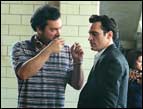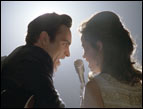feature
Ring of Fire: The Music of Johnny Cash
By Chris Carpenter
CBN.com Program Director
CBN.com
– When I was just a baby, my mama told me, ‘Son, always be a good boy, don’t ever play with guns’. But I shot a man in Reno just to watch him die.
-- Johnny Cash, “Folsom Prison Blues”
As the aforementioned song lyrics suggest, Johnny Cash was a man of great contrasts. From his God fearing, hardscrabble upbringing in rural Arkansas, this icon of American music was known as much for the emotional darkness that tormented him throughout his life as he was for his eternal journey of faith.
According to Rolling Stone magazine, Cash, who died in 2003, “… was a born again Christian whose gospel albums thundered with righteous indignation over humankind’s sinful ways.” Yet he was a recovering drug addict who once told The 700 Club’s Scott Ross that “one is too many and 1,000 is not enough.”
Simply put, Johnny Cash was an enigma, his career that of a tormented superstar. Despite all of the bleak negativity that permeated the earlier portion of his life, Cash fought fiercely to overcome his demons through the love of his life, June Carter, and his unquenchable thirst for redemption through faith in Jesus Christ.
In coming days, you will likely become inundated by all things Johnny Cash. In addition to an upcoming television tribute special (tomorrow night), a new dazzling CD box set, and a Broadway musical set to debut early next year, Walk the Line is a stunning major motion picture starring Joaquin Phoenix and Reese Witherspoon set to open nationwide this Friday.
The film is an unflattering portrayal of the early relationship between Johnny and June, a period of Cash’s life inundated by his drug use, infidelity, and a desperate attempt to flee from his father’s bitterness toward him. Armed with just a guitar and a few simple chords, the self proclaimed Man in Black did not set out to change the world but to change himself instead. He did so the hard way … one song at a time, all the while refusing to accept the scorn and rejection of his critics.
That is what made Johnny Cash so special. At his core, he tapped into the heart of America. He was a self-made man, a blue collar worker, just like everyone else.
“It is not like he was just touched by God and everything he sings or does is genius,” says James Mangold, who directed and co-wrote Walk the Line. “He is someone stumbling into greatness. That is part of what made John so appealing to so many people is that he did not seem like he was from another planet. He seemed like you or I.”
“ You always feel like you are right there in the room with him,” adds Phoenix, who had no previous guitar experience before accepting the role to play Johnny Cash. “He was just a man on a stage, very unpretentious.” You always feel like you are right there in the room with him,” adds Phoenix, who had no previous guitar experience before accepting the role to play Johnny Cash. “He was just a man on a stage, very unpretentious.”
Taking a risk, Mangold opted to use the voices of Phoenix and Witherspoon rather than dubbing in the original voices of Johnny and June in the many musical scenes. To do so required Phoenix actually learning how to sing, Witherspoon figuring out how to play an autoharp, and for the pair to overcome the fear and trepidation of performing in front of hundreds of people.
“There were several ways to attack this but the clearest was I don’t think we could have done the movie any other way,” comments Mangold. “There are no tapes of John auditioning at Sun Records. There are no tapes of John working out the lyrics to ”Folsom Prison”. The things that I put in the script that I wanted to see were these songs being born. So, the idea of having someone as talented and honest and searing and volcanic as Joaquin at my disposal really made the decision justifiable.”
“I nearly hit the floor when they asked me to sing,” recounts Witherspoon. “I thought you have to be kidding me. If someone asks me to try I will never say that I can’t. One week, became two weeks, turned into three months, turned into six months, became a movie. And it was a challenge. But I just couldn’t back down.”
If anything, Walk the Line will likely become a lens for viewing the electrifying complexities of a man torn by the tragic death of a loved one (his brother Jack), fueled by forbidden love, and driven by the harrowing feelings of failure. tragic death of a loved one (his brother Jack), fueled by forbidden love, and driven by the harrowing feelings of failure.
Says Phoenix, “The toughest thing about researching someone like John is every time you turn a page in his book ("Man in Black") you say to yourself ‘this is amazing’. How do we not tell this story?”
Today, Johnny Cash is seen as an American icon, an almost mythical figure of modern music. But as recently as a decade ago his career was floundering, on the verge of becoming just a footnote in the annals of music history. Dropped by his music label in the early 1990’s, Cash struggled with the prospect of becoming a caricature of himself or worse, fading into musical oblivion.
This was a far cry from practically forcing his way onto the Sun Records label in 1955 and subsequently garnering 11 number one hits over a 40 year period. Country radio staples “I Walk the Line”, “Ring of Fire”, and “A Boy Named Sue” seemed destined to become relics of a bygone era.
But music producer Rick Rubin saw something different. The shaggy music impresario, known for his work with such current music luminaries as the Red Hot Chili Peppers and Tom Petty, offered Cash the opportunity to record whatever he wanted with him. So, over the next eight years, they released five albums together. The decision to work with Rubin netted Cash five Grammy Awards as well as record sales soaring into the multi-millions.
But beyond the accolades and resurrected financial portfolio, these albums re-established Johnny Cash as not only a player in the recording industry but more importantly, cemented his status as an American musical legend.
Going forward, Johnny Cash will be remembered as a man of redemption. He was a man of great contradictions who struggled throughout his life to rebuild everything he had torn down. With the help of June, the last 35 years of his life were filled with the sweetness that had so eluded him during his formative years. In the end, Johnny Cash finally decided to let go and let God.
“It’s not like John’s path is one you would recommend to somebody but he knew what sin was,” explains Mangold. “And he knew what mistakes felt like. And he knew what it was to forgive. Part of the reason for that is because of faith.”
Johnny Cash was truly a man who lived what he wrote and wrote what he lived. He walked the line.

CBN IS HERE FOR YOU!
Are you seeking answers in life? Are you hurting?
Are you facing a difficult situation?
A caring friend will be there to pray with you in your time of need.
|